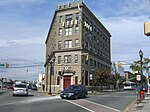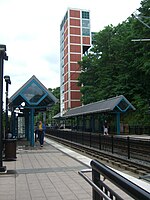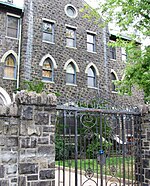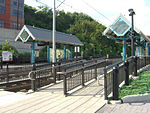Washington Park (Hudson County)
County parks in New JerseyGeography of Jersey City, New JerseyParks in Hudson County, New JerseyUnion City, New Jersey

Washington Park is part of the Hudson County Park System in Hudson County, New Jersey. It straddles the border of Union City and the Heights neighborhood of Jersey City. Spread over 21 acres (8.5 ha), it comprises 4 sections traversed by various streets, including Paterson Plank Road (the city line) and Palisade Avenue. Land for the park was acquired in 1917, which was further developed during the Works Progress Administration in the 1930s.
Excerpt from the Wikipedia article Washington Park (Hudson County) (License: CC BY-SA 3.0, Authors, Images).Washington Park (Hudson County)
Irving Street, Jersey City
Geographical coordinates (GPS) Address Nearby Places Show on map
Geographical coordinates (GPS)
| Latitude | Longitude |
|---|---|
| N 40.752811 ° | E -74.044714 ° |
Address
Irving Street 1
07307 Jersey City
New Jersey, United States
Open on Google Maps









